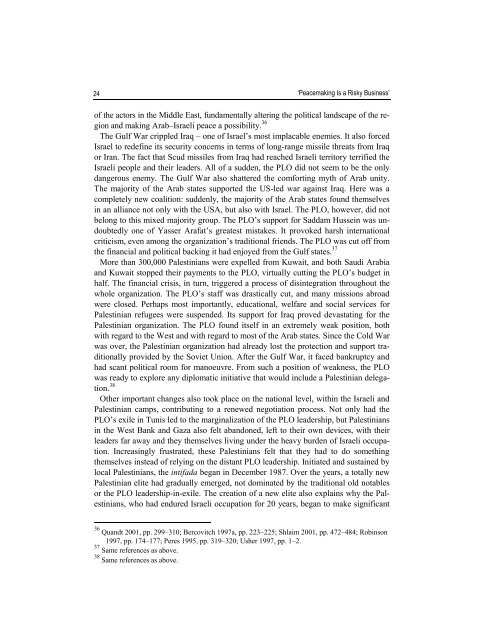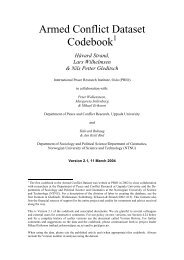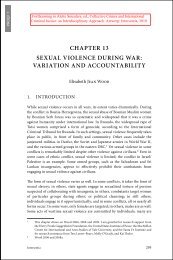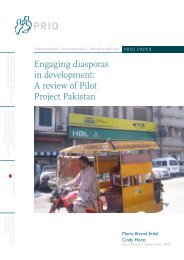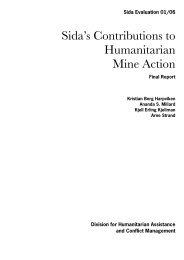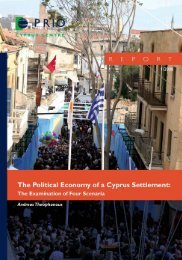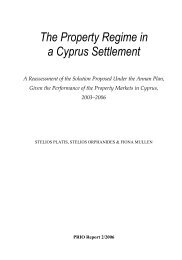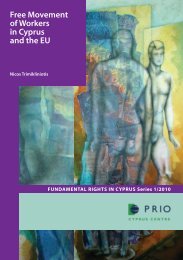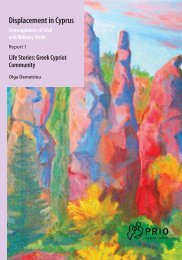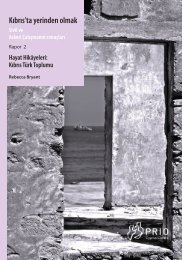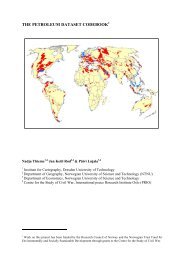Peacemaking Is a Risky Business - PRIO
Peacemaking Is a Risky Business - PRIO
Peacemaking Is a Risky Business - PRIO
Create successful ePaper yourself
Turn your PDF publications into a flip-book with our unique Google optimized e-Paper software.
24 ‘<strong>Peacemaking</strong> <strong>Is</strong> a <strong>Risky</strong> <strong>Business</strong>’of the actors in the Middle East, fundamentally altering the political landscape of the regionand making Arab–<strong>Is</strong>raeli peace a possibility. 36The Gulf War crippled Iraq – one of <strong>Is</strong>rael’s most implacable enemies. It also forced<strong>Is</strong>rael to redefine its security concerns in terms of long-range missile threats from Iraqor Iran. The fact that Scud missiles from Iraq had reached <strong>Is</strong>raeli territory terrified the<strong>Is</strong>raeli people and their leaders. All of a sudden, the PLO did not seem to be the onlydangerous enemy. The Gulf War also shattered the comforting myth of Arab unity.The majority of the Arab states supported the US-led war against Iraq. Here was acompletely new coalition: suddenly, the majority of the Arab states found themselvesin an alliance not only with the USA, but also with <strong>Is</strong>rael. The PLO, however, did notbelong to this mixed majority group. The PLO’s support for Saddam Hussein was undoubtedlyone of Yasser Arafat’s greatest mistakes. It provoked harsh internationalcriticism, even among the organization’s traditional friends. The PLO was cut off fromthe financial and political backing it had enjoyed from the Gulf states. 37More than 300,000 Palestinians were expelled from Kuwait, and both Saudi Arabiaand Kuwait stopped their payments to the PLO, virtually cutting the PLO’s budget inhalf. The financial crisis, in turn, triggered a process of disintegration throughout thewhole organization. The PLO’s staff was drastically cut, and many missions abroadwere closed. Perhaps most importantly, educational, welfare and social services forPalestinian refugees were suspended. Its support for Iraq proved devastating for thePalestinian organization. The PLO found itself in an extremely weak position, bothwith regard to the West and with regard to most of the Arab states. Since the Cold Warwas over, the Palestinian organization had already lost the protection and support traditionallyprovided by the Soviet Union. After the Gulf War, it faced bankruptcy andhad scant political room for manoeuvre. From such a position of weakness, the PLOwas ready to explore any diplomatic initiative that would include a Palestinian delegation.38Other important changes also took place on the national level, within the <strong>Is</strong>raeli andPalestinian camps, contributing to a renewed negotiation process. Not only had thePLO’s exile in Tunis led to the marginalization of the PLO leadership, but Palestiniansin the West Bank and Gaza also felt abandoned, left to their own devices, with theirleaders far away and they themselves living under the heavy burden of <strong>Is</strong>raeli occupation.Increasingly frustrated, these Palestinians felt that they had to do somethingthemselves instead of relying on the distant PLO leadership. Initiated and sustained bylocal Palestinians, the intifada began in December 1987. Over the years, a totally newPalestinian elite had gradually emerged, not dominated by the traditional old notablesor the PLO leadership-in-exile. The creation of a new elite also explains why the Palestinians,who had endured <strong>Is</strong>raeli occupation for 20 years, began to make significant36 Quandt 2001, pp. 299–310; Bercovitch 1997a, pp. 223–225; Shlaim 2001, pp. 472–484; Robinson1997, pp. 174–177; Peres 1995, pp. 319–320; Usher 1997, pp. 1–2.37 Same references as above.38 Same references as above.


